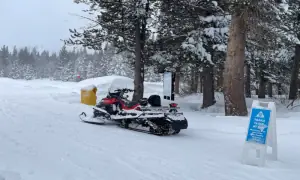Supreme Court suspends new law even before it takes effect
6 min readIn an unprecedented move, the Supreme Court of Pakistan has suspended a law that is yet to take effect. The Supreme Court Procedure and Practices Bill 2023, which governs the use of discretionary powers of the chief justice of Pakistan, will take effect on April 20.
An eight-member Supreme Court of Pakistan bench heard petitions against the upcoming law on Thursday and adjourned for an indefinite period after issuing notices to political parties, the Pakistan Bar Council and the Supreme Court Bar Association.
However, in the written order issued later in the day the court suspended the law after admitting that “ordinarily the provisions of a law cannot be suspended because this Court can only suspend a particular order, judgment or action.”
The court said it was making the unusual move because the parliament had enacted a law that was “not permissible under any constitutional provision” and once that law comes into force it will affect the working of the top court.
“In our view, the facts and circumstances presented here are extraordinary both in import and effect. Prima facie the contentions raised disclose that there is a substantial, immediate and direct interference with the independence of the judiciary in the form of multiple intrusions, in the guise of regulating the practice and procedure of this Court and conferring upon it a jurisdiction that appears not to be permissible under any constitutional provision. Such intermeddling in the functioning of the Court, even on the most tentative assessment, will commence as soon as the Bill becomes the Act.
“Accordingly, in our view an interim measure ought to be put in place, in the nature of an anticipatory injunction.”
The court said that the law will be suspended the moment it receives assent from the president.
“The making of such an injunction, to prevent imminent apprehended danger that is irreparable, is an appropriate remedy, recognized in our jurisprudence and other jurisdictions that follow the same legal principles and laws. It is therefore hereby directed and ordered as follows: The moment that the Bill receives the assent of the President or (as the case may be) it is deemed that such assent has been given, then from that very moment onwards and till further orders, the Act that comes into being shall not have, take or be given any effect nor be acted upon in any manner.”
The order coincided with another development Thursday evening: the National Assembly passed a resolution against the eight-member bench hearing the petitions against the new law.
The court also said that the case would resume hearing on May 2 and ordered that all major political parties be notified including PMLN, PPP, JUI(F), PTI and MQM.
‘Independence of judiciary a serious matter’
Earlier during the hearing, Justice Umar Ata Bandial remarked that the independence of the judiciary was a serious matter but also said that he has immense respect for the parliament.
“We need to examine if this law goes against the constitution,” Justice Bandial added.
He also added that the case was being adjourned for now and he would confer with other members of the bench before fixing another date.
The PDM government on Thursday rejected the bench as “controversial” and boycotted its proceedings, but judges sat under CJP Umar Ata Bandial and heard from the petitioners, who want the Supreme Court Procedure and Practices Bill 2023 scrapped.
The bill has been passed by the Parliament twice and will become law by April 20 even if President Alvi does not sign it.
The new law takes away the power of taking suo motu notice from the CJP and gives it to a three-member committee comprising the most senior judges including the CJP.
It also grants the right to appeal against judgments issued under Article 184(3) of the Constitution.
But most crucially, it also takes away CJP’s discretionary power to form benches and gives it to the aforementioned three-member committee.
The CJP formed the eight-member bench on Wednesday on petitions filed by four people including two lawyers.
The coalition government released a statement rejecting the bench and terming the eight-member bench “controversial”.
In the statement, they vowed to resist attempts to take away parliament’s authority and to interfere in its constitutional scope.
The government minister says the CJP has initiated proceedings against a bill that had not yet become law. Under the law, courts cannot shoot down legislation before it is enacted, they say.
But had the law already taken force, the CJP would not have been able to form the eight-member bench of his choice.
It is not clear, how events will unfold after April 20 when the new law takes effect.
SC forms eight-member bench
The CJP formed an eight-member bench to hear petitions against the Supreme Court Procedure and Practices Bill 2023.
The bench includes the following judges:
- Justice Umar Ata Bandial
- Justice Ijaz ul Ahsan
- Justice Munib Akhtar
- Justice Mazahar Naqvi
- Justice Muhammad Ali Mazhar
- Justice Ayesha A. Malik
- Justice Syed Hassan Azhar Rizvi
- Justice Shahid Waheed
It is noteworthy that none of the judges that had dissented with how the chief justice took suo motu notice of the delay in elections in Punjab are included in the bench. The bench also includes Justice Ijaz and Justice Mazahar who have been accused by government parties of having a pro-PTI bias.
The bill was recently passed through a joint session of parliament and said that the chief justice of Pakistan should not have sole discretion to form benches and take suo motu notices.
SC summons finance secretary and SBP governor over election funding
The Supreme Court of Pakistan summoned the secretary of finance as well as the governor of the State Bank of Pakistan to appear in person to answer why funds for Punjab elections have not been issued.
Notices have also been issued to the attorney general and secretary of election commission. The officials have been told to appear in court on April 14.
The notices come after the Election Commission of Pakistan (ECP) submitted a sealed report in the court on Tuesday, which said that the government had not provided funding or security required for the elections.
The court had ordered on April 4 that elections in Punjab should be held on May 14 and the governments at center and Punjab should provide whatver help needed to make sure elections can be organised.
Government’s reluctance to provide funding and security
The government’s reluctance to provide security and funding was the main reason the ECP had cited in moving elections from April 30 to October 8.
The minsitry of finance had told the ECP that it could not spare the Rs21 billion needed for the elections due to the state of the economy. The interior ministry had said that security personnel were needed for census and anti-terror operations.
The authorities had maintained the same opinion in the court as well, which had led to the court’s orders that the government should provide funds by April 10 and security and had asked the ECP to submit a progress report by April 11.
“Court’s decision is binding”
PTI’s Fawad Chaudhry said that the since the Supreme Court had clearly laid out what was to be done, it is up to the institutions and their leaders to make sure that the decision is implemented.
He also said that if elections are not held as per the court’s orders it would put the SC in danger.
For the latest news, follow us on Twitter @Aaj_Urdu. We are also on Facebook, Instagram and YouTube.


























Comments are closed on this story.